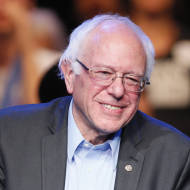
U.S. Democratic Presidential candidate Bernie Sanders has refrained from discussing his Jewish background and has many voters concerned that he would not support Israel if elected.
As Bernie Sanders headed toward victory in New Hampshire, observers noted the barrier he was about to break: Sanders would become the first Jewish candidate to win a major party presidential primary.
But instead of the burst of communal pride that usually accompanies such milestones, the response from American Jews has been muted. One reason: The Vermont senator, the candidate who has come closer than any other Jew to being a major party presidential nominee, has mostly avoided discussing his Judaism.
Sanders won’t identify the Israeli kibbutz where he briefly volunteered in the 1960s. When reporters found the kibbutz, Sha’ar Ha’amakim in northern Israel, he wouldn’t comment.
In New Hampshire, he described himself as “the son of a Polish immigrant,” not a Jewish one. At a Democratic debate, he spoke of the historic nature of “somebody with my background” seeking the presidency, but didn’t say “Jewish.” A recent headline in the liberal Jewish Daily Forward newspaper read, “We Need To Out Bernie Sanders as a Jew — For His Own Good.”

Rabbi James Glazier of Temple Sinai, Vermont, asked why Sanders said his father was a Polish immigrant, rather than a Jewish Polish immigrant. (templesinaivt.org)
Rabbi James Glazier of Temple Sinai, in South Burlington, Vermont, said Sanders’ comments were being discussed by fellow rabbis in the liberal Reform movement. “What did he leave out there? He didn’t say ‘Jewish Polish’ immigrant. Reform rabbis have picked up on this big time.”
Sanders’ lack of religious observance is not what rankles. Many Jews identify “culturally” instead of religiously with the faith.
But unlike some other prominent non-observant Jews, Sanders, during more than three decades as a mayor, congressman and U.S. senator, has developed few relationships with Jewish groups or leaders on religious issues or on Israel. He has supported a two-state solution to the Israeli-Palestinian conflict, but has not made Israel in a priority.
“I would say that he has never been one of those in Congress who was active in a Jewish caucus, who turned out for Israel, who was involved in those issues — and he still isn’t,” said Jonathan Sarna, an expert in American Jewish history at Brandeis University.
Ironically, when Sanders gave his most religiously focused campaign speech, he underscored his distance from Judaism. It was last fall at Liberty University, the evangelical school founded by the Rev. Jerry Falwell in Virginia, and Sanders addressed the school on Rosh Hashana, or the Jewish New Year.
Discussing his beliefs in the speech, he said he was “motivated by a vision” for social justice “which exists in all of the great religions.” Later, he attended a local Rosh Hashana (Jewish New Year) gathering.
The Sanders campaign did not respond to repeated requests for comment.
Sanders has said the Holocaust wiped out much of his father’s family in Poland. As a child in Brooklyn, Sanders went to Hebrew school and had a bar mitzvah.
“Being Jewish is very important to us,” his brother, Larry, said in an interview. “There was no problem of debate, it was just a given in our lives, just as being Americans was a given in our lives. But Bernard is not particularly religious. He doesn’t go to synagogue often. I think he probably goes to synagogue only for weddings and funerals, rather than to pray.”
In his secular-leaning home state, Sanders was rarely called on to discuss his faith. In 1988, he married his second wife, Jane, who was raised Roman Catholic.
He has been facing increasing challenges about his support for Israel.
At a 2014 Vermont event, after Israel had launched Operation Protective Edge in response to the constant rockets launched at Israel by Hamas, the Islamic terrorist group that controls Gaza, some voters demanded Sanders do more to protest Israeli bombing.
Sanders: ‘I Believe in a Two-State Solution’
Sanders said Israel “overreacted” with the intensity of its attacks, and he called the bombing of U.N. schools “terribly, terribly wrong.” But he also criticized Hamas for launching rockets into Israel. Israel has said Hamas is responsible for civilian casualties, since it carried out numerous attacks from residential areas in Gaza and uses Palestinian men, women and children as human shields.
“I believe in a two-state solution, where Israel has the right to exist in security at the same time the Palestinians have a state of their own,” Sanders said.
Despite Sanders’ reticence about discussing his Jewish roots, his religious identity is clear, Sarna said.
“I think it is very much a statement about America that someone who everybody knows is of Jewish background and has a Jewish name and sounds Jewish from Brooklyn can get several delegates,” Sarna said. “There is a sense that only in America could a Bernie Sanders be a candidate.”
By: AP and United with Israel Staff
Subscribe to Our FREE Newsletter for More Great Stories Like This One
United with Israel publishes stories like this every day. We believe that our work allows a more balanced view of Israel to emerge. With so much anti-Israel media bias out there from outlets like CNN and the BBC, helping the Holy Land means getting our message out to as many people as possible.
You can help.
Subscribe to our free newsletter to ensure that you get the latest and best stories from United with Israel. Together we can make a difference, and it starts with communication.
CLICK HERE TO SUBSCRIBE TO OUR FREE NEWSLETTER
Source: United with Israel


